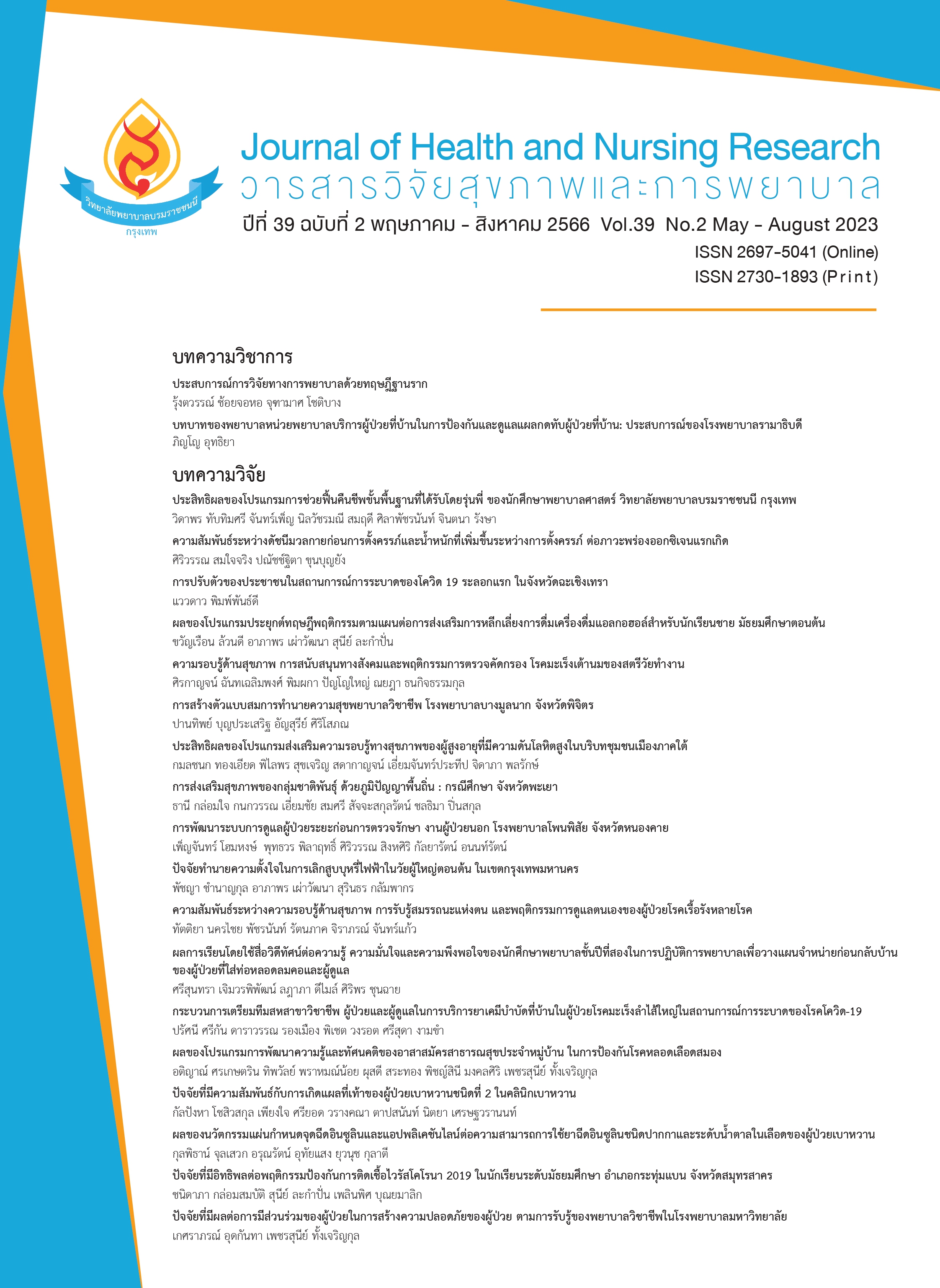ประสบการณ์การวิจัยทางการพยาบาลด้วยทฤษฎีฐานราก
คำสำคัญ:
ทฤษฎีฐานราก , การพยาบาล , การสร้างทฤษฎีเนื้อหา , ประสบการณ์บทคัดย่อ
บทนำ: ทฤษฎีฐานรากเป็นวิธีการวิจัยเชิงคุณภาพ เพื่อค้นพบหรือสร้างทฤษฎีจากข้อมูลที่ได้มาและวิเคราะห์อย่างเป็นระบบโดยใช้การวิเคราะห์เปรียบเทียบคงที่ แม้ว่าทฤษฎีฐานรากจะมีความยืดหยุ่น แต่วิธีการมีความซับซ้อน ดังนั้น นักวิจัยจึงควรทำเข้าใจแนวคิดทฤษฎีก่อนนำไปประยุกต์ใช้ในการวิจัยทางการพยาบาลเพื่อให้ถูกต้องตามกระบวนการของทฤษฎีฐานราก
วัตถุประสงค์: เพื่อให้ความรู้เกี่ยวกับการวิจัยทางการพยาบาลด้วยทฤษฎีฐานราก
ประเด็นสำคัญ: วิธีการศึกษาทฤษฎีฐานราก เป็นวิธีการวิจัยที่ขั้นตอนของการวิเคราะห์และการเก็บรวบรวมข้อมูลทำควบคู่กันไป โดยวิธีการวิเคราะห์การเปรียบเทียบคงที่ เพื่อจัดหมวดหมู่ จนข้อมูลอิ่มตัว เพื่อให้ได้ทฤษฎีจากข้อมูลที่เรียกว่าทฤษฎีเนื้อหา (substantive theory)
สรุป: ทฤษฎีฐานรากพัฒนามาจากแนวคิดปฏิสัมพันธ์เชิงสัญลักษณ์ คุณลักษณะที่สำคัญของทฤษฎี ประกอบด้วย การสุ่มกลุ่มตัวอย่างเชิงทฤษฎี การเปรียบเทียบคงที่ ความไวทางทฤษฎี การให้รหัสและการจัดหมวดหมู่ เพื่อพัฒนาหรือสร้างทฤษฎี
ข้อเสนอแนะเพื่อนำไปใช้: นักวิจัยสามารถนำความรู้เกี่ยวกับทฤษฎีฐานรากไปประยุกต์ใช้ในการวิจัยเพื่อพัฒนาหรือสร้างทฤษฎีทางการพยาบาลในมุมมองอื่นได้
Downloads
เอกสารอ้างอิง
Holloway I, Galvin K. Qualitative research in nursing and health care. 4thed. London: Blackwell; 2017.
Cullen MM, Brennan NM. Grounded Theory: Description, Divergences and Application. Rev Account Finance 2021;27. doi:10.52399/001c.22173.
Glaser BG, Strauss AL. The discovery of grounded theory: Strategies for qualitative research. New York: Aldine Publishing; 1967.
Klunklin A, Uppor W. Grounded Theory Study in Nursing Research. Nursing J 2019;46(Supplement December):116-27. (in Thai)
Mead, GH. Mind, self and society. Chicago: The University of Chicago Press; 1934.
Charmaz K. Constructing grounded theory: a practical guide through qualitative analysis. London: Sage; 2014.
Blumer H. Symbolic interactionism: Perspective and method. Berkeley; 1969.
Klunklin A, Greenwood J. Symbolic Interactionism in grounded theory studies: Women surviving with HIV/AIDS in rural northern Thailand. J. Assoc. Nurses AIDS Care 2006;17(5):32-41. doi:10.1016/j.jana.2006.07.005.
West R, Turner LH. Understanding interpersonal communication: Making choices in changing times. Wassworth: Cengage learning; 2010.
Aldiabat KM, Le Navenec C. Philosophical roots of classical grounded theory: Its foundations in symbolic interactionism. Qual Rep 2011;16(4):1063-80. Available from: http://nsuworks.nova.edu/tqr/vol16/iss4/9
Handberg C, Thorne S, Midtgaard J, Nielsen CV, Lomborg K. Revisiting symbolic interactionism as a theoretical framework beyond the grounded theory tradition. Qual Health Res 2015;25(8), 1023-32. doi:10.1177/1049732314554231.
Streubert HJ, Carpenter DR. Qualitative research in nursing: Advancing the humanistic imperative. 5th ed. Philadelphia: Lippincott Williams & Wilkins; 2011.
Chamberlain-Salaun J, Mills J and Usher K. Linking symbolic interactionism and grounded theory methods in a research design: from Corbin and Strauss’ assumptions to action. SAGE Open 2013;3(3), 215824401350575. doi: 10.1177/2158244013505757
Chun Tie Y, Melanie Birks M, Francis K. Grounded theory research: A design framework for novice researchers. Sage Open Med 2019;7:1-8.
Corbin JM, Strauss AL. Basics of qualitative research, techniques and procedures for developing grounded theory.4th ed. Sage; 2015.
Glaser BG. Theoretical sensitivity. Mill Valley: Sociology Press; 1978.
Creswell JW. Qualitative inquiry research design: choosing among five approaches. 3rd ed. Thousand Oaks: Sage; 2013.
Holloway I, Todres L. Grounded theory. In Gerrish K, Lacey A, editors. The research process in nursing. 6th ed. Oxford: Wiley Blackwell; 2010. p. 153-64.
Rose S, Spinks N, Isabel Canhoto A. Management research: applying the principles. New York: Routledge; 2015. p. 1-6. Available from: https://docplayer.net/21772930-Grounded-theory-1-introduction-1-2-applications-of-grounded-theory-1-3-outline-of-the-design-2.html
Choijorhor R, Kantaruksa K, Chotibang J, Chaloumsuk N. Experience of exclusive breastfeeding among first-time mothers of late preterm infants: A grounded theory study [doctoral’s thesis]. Chiang Mai: Chiang Mai University; 2020.
ดาวน์โหลด
เผยแพร่แล้ว
รูปแบบการอ้างอิง
ฉบับ
ประเภทบทความ
สัญญาอนุญาต
ลิขสิทธิ์ (c) 2023 วารสารวิจัยสุขภาพและการพยาบาล (วารสารวิทยาลัยพยาบาลบรมราชชนนี กรุงเทพ)

อนุญาตภายใต้เงื่อนไข Creative Commons Attribution-NonCommercial 4.0 International License.
บทความที่ได้รับการตีพิมพ์ เป็นลิขสิทธิ์ของวารสารวิจัยสุขภาพและการพยาบาล (วิทยาลัยพยาบาลบรมราชชนนี กรุงเทพ) ไม่สามารถนำไปตีพิมพ์ซ้ำในวารสารฉบับอื่น


















